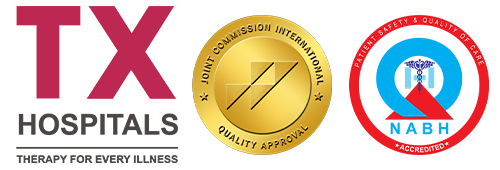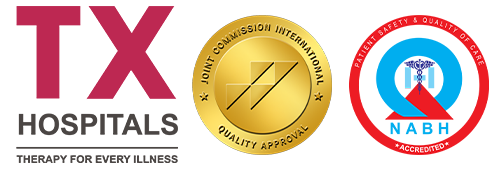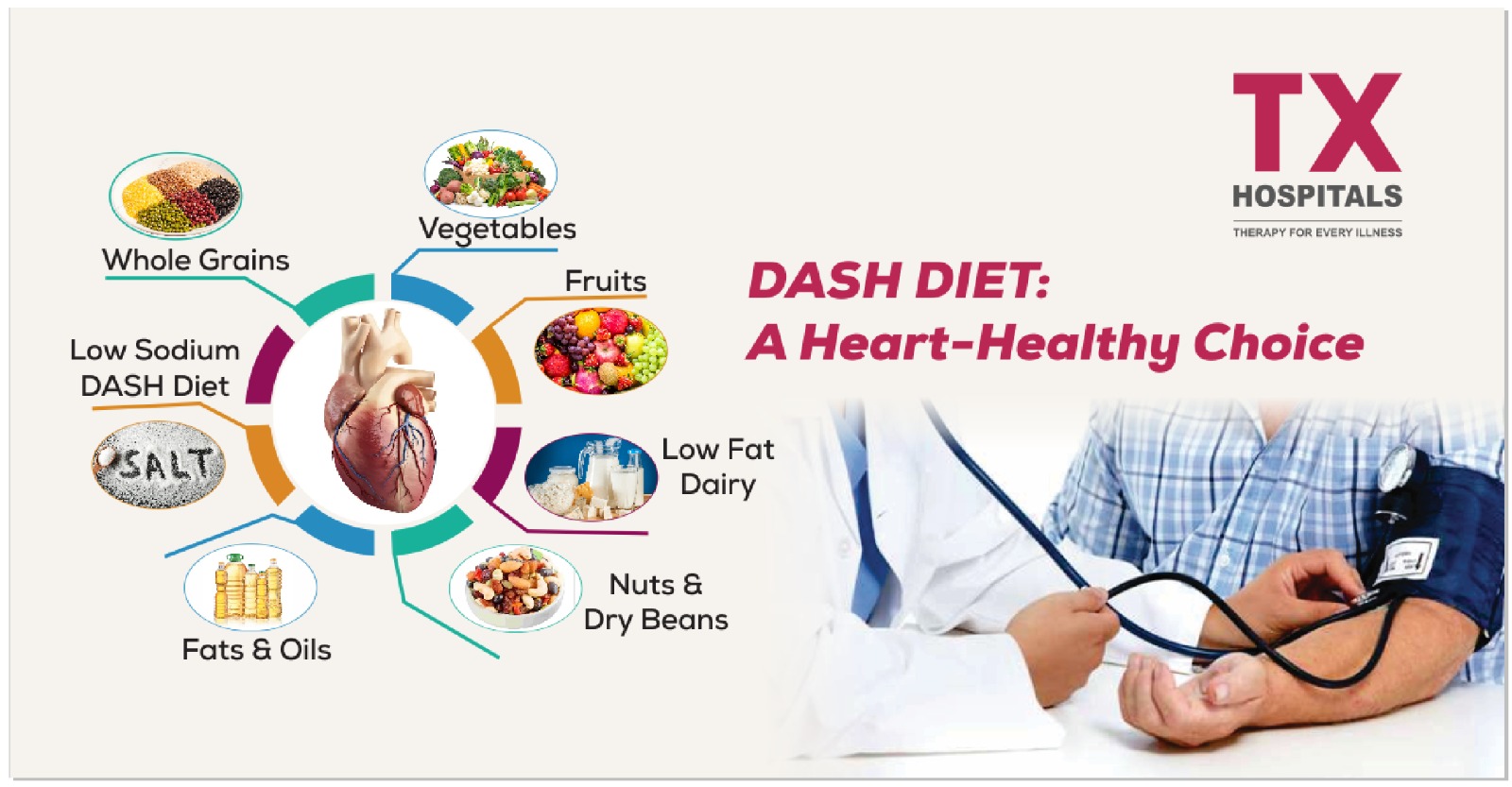High blood pressure or hypertension, affects millions worldwide and is a leading cause of heart disease, stroke, and kidney complications. The Dietary Approaches to Stop Hypertension (DASH) Diet offers a scientifically proven, sustainable method to manage and lower blood pressure while improving overall heart health. For those seeking expert care for heart-related concerns, TX Hospitals, one of the best cardiology hospitals in Hyderabad, provides specialized treatments with the help of expert cardiologists.
What is the DASH Diet?
The DASH diet is based on two key studies—DASH and DASH-Sodium—which investigated the effects of dietary changes on blood pressure. These studies showed that participants who followed the DASH diet, rich in vegetables, fruits, low-fat dairy, and low in saturated fats and cholesterol, experienced a significant reduction in blood pressure within just two weeks. This scientific foundation is what makes the DASH diet a powerful, evidence-backed solution for managing hypertension and promoting heart health
Why is Healthy Blood Pressure Important?
Uncontrolled high blood pressure makes the heart work harder, leading to arterial damage, reduced organ function, and heightened risks of Heart attacks, Strokes and Kidney failure.
The DASH diet targets these issues by promoting nutrient-rich foods and reducing sodium intake, effectively lowering blood pressure and supporting overall cardiovascular health.
Key Components of the DASH Diet
Recommended Food Groups and Servings (based on a 2,000-calorie diet):
- Grains: 6–8 servings/day (opt for whole grains)
- Vegetables: 4–5 servings/day.
- Fruits: 4–5 servings/day.
- Low-fat Dairy: 2–3 servings/day.
- Lean Protein: 6 ounces or fewer/day.
- Nuts, Seeds, Legumes: 4–5 servings/week.
- Fats and Oils: 2–3 servings/day.
- Sweets: 5 or fewer servings/week (focus on low-sugar options).
- Sodium Intake:
- Standard DASH Diet: Limits sodium to 2,300 mg/day.
- Lower Sodium DASH Diet: Targets 1,500 mg/day for stricter blood pressure control.
- Nutritional Highlights:
- Potassium: 4,700 mg/day
- Calcium: 1,250 mg/day
- Magnesium: 500 mg/day
Sodium Guidelines
The DASH diet offers two sodium levels:
- Standard DASH: 2,300 mg/day.
- Lower Sodium DASH: 1,500 mg/day for stricter control.
Tips to reduce sodium:
- Choose fresh over processed foods.
- Use herbs and spices instead of salt.
- Read labels for “low-sodium” options.
Core Principles of the DASH Diet
The DASH diet is centered on whole, nutrient-dense foods to help lower blood pressure and improve heart health:
- Emphasis on Vegetables and Fruits: Rich in potassium, magnesium, and fiber, these foods help balance sodium levels and reduce blood pressure.
- Whole Grains: Whole grains like oats, brown rice provide fiber that helps manage blood sugar, cholesterol levels, and overall heart health.
- Lean Proteins: Lean sources of protein such as poultry, fish, and legumes help lower saturated fat intake, which is beneficial for heart health.
- Low-Fat Dairy: Includes milk, yogurt, and cheese to provide calcium and vitamin D, which support strong bones and healthy blood pressure.
- Limiting Saturated Fat, Added Sugars, and Sodium: Reducing processed foods, added sugars, and sodium helps prevent high blood pressure, heart disease, and weight gain.
Key Benefits of the DASH Diet
- Lowers Blood Pressure: The primary benefit of the DASH diet is reducing both systolic and diastolic blood pressure, which lowers the risk of heart disease and stroke.
- Improves Heart Health: By lowering LDL (“bad”) cholesterol and increasing HDL (“good”) cholesterol, the DASH diet supports heart function and reduces cardiovascular risks.
- Supports Weight Management: The diet promotes weight loss by focusing on low-calorie, a nutrient-rich food, which helps with overall weight management and prevents obesity-related conditions.
- Reduces the Risk of Type 2 Diabetes: The diet helps improve insulin sensitivity, stabilizing blood sugar levels and reducing the risk of developing diabetes.
- Reduces Cancer Risk: A diet rich in fruits, vegetables, and fiber has been linked to a reduced risk of certain cancers, particularly colorectal cancer.
- Promotes Digestive Health: The high fiber content from fruits, vegetables, and whole grains supports regular digestion and gut health.
- Supports Bone Health: The inclusion of calcium-rich foods like low-fat dairy and leafy greens helps prevent osteoporosis and promotes bone strength.
Lifestyle Tips for Sustained Success
- Make Gradual Changes: Start by adding more fruits and vegetables to meals. Gradual changes make the diet easier to stick with over time.
- Limit Processed Foods: Choose fresh or frozen foods over canned or packaged products to reduce sodium, added sugars, and unhealthy fats.
- Balance Protein Sources: Include plant-based proteins like beans, lentils, and tofu alongside lean meats for added fiber and heart health benefits.
- Exercise Regularly: Aim for 30–60 minutes of moderate-intensity exercise most days. Regular physical activity helps lower blood pressure and maintains overall health.
Take Control Today
The DASH diet is not a temporary solution; it’s a long-term lifestyle adjustment. By embracing its principles, you can significantly improve your health, reduce dependence on medications, and pave the way for a heart-healthy future. Speak with a healthcare provider to ensure that the DASH diet is right for you, and take the first step towards healthier living today. If you’re looking for personalized care, consult with the best cardiologists in Hyderabad at TX Hospitals, to get expert guidance on managing hypertension and improving heart health.








